chapter24双语讲义
- 格式:doc
- 大小:53.50 KB
- 文档页数:3
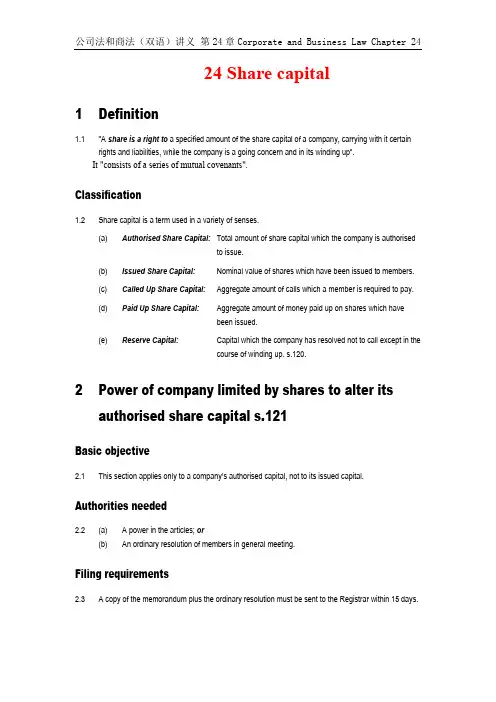
24 Share capital1 Definition1.1 "A share is a right to a specified amount of the share capital of a company, carrying with it certainrights and liabilities, while the company is a going concern and in its winding up".It "consists of a series of mutual covenants".Classification1.2 Share capital is a term used in a variety of senses.(a) Authorised Share Capital:Total amount of share capital which the company is authorisedto issue.(b) Issued Share Capital:Nominal value of shares which have been issued to members.(c) Called Up Share Capital:Aggregate amount of calls which a member is required to pay.(d) Paid Up Share Capital:Aggregate amount of money paid up on shares which havebeen issued.(e) Reserve Capital:Capital which the company has resolved not to call except in thecourse of winding up. s.120.2 Power of company limited by shares to alter itsauthorised share capital s.121Basic objective2.1 This section applies only to a company’s authorised capital, not to its issued capital. Authorities needed2.2 (a) A power in the articles; or(b) An ordinary resolution of members in general meeting.Filing requirements2.3 A copy of the memorandum plus the ordinary resolution must be sent to the Registrar within 15 days.Other purposes2.4 It is used for increasing, consolidating, sub-dividing or reducing the amount stated as its authorisedcapital in the memorandum.3 Directors' authority to allot shares (s.80) Authorisation3.1 (a) The directors of a company may not allot shares unless they are authorised to do so:-(i) By the articles, or(ii) By ordinary resolution.(b) The authority to allot:(i) may be particular/general; conditional/unconditional(ii) must state:(a) the maximum number of shares which may be allotted.(b) the date on which the authority expires.(iii) must not be for a period of more than 5 years from:(a) the date of incorporation (if authority was in the original articles).(b) the date of a resolution giving authority.(iv) can be extended beyond 5 years by private companies using an elective resolution orit may be renewed for further periods of up to 5 years by any company subject to thesame restrictions.(v) may be revoked or varied at any time by the members in general meeting. Contravention of S.803.2 (a) Any director who contravenes or permits/authorises a contravention of s.80 will be liable to afine.(b) This will not affect the validity of any allotment of shares s.80.Directors’ duties3.3 Although the directors have the authority to allot shares they must remember their fiduciary duties tothe company and accordingly:(a) They must act in the best interests of the company and issue shares for a proper purpose.Howard Smith v. Ampol Petroleum(b) They must not allot to prevent a take-over;Hogg v. CramphornUnless sanctioned by a general meeting;Bamford v. Bamford4 Pre-emption rightsMain rule4.1 Where any company (public or private) issues equity shares WHOLLY FOR CASH, it must first offerthem to existing equity shareholders in proportion to the nominal value of their equity holding: s.89 Notification of shareholders4.2 Holders of registered shares must receive notice in writing.Period of offer4.3 (a) The offer must be open for at least 21 days.(b) No allotment may be made until:-(i) the offer period has expired or(ii) every offer made has been accepted or refused s.89Private company exclusions. s.914.4 Private companies will not be bound by s.89 if their memorandum or articles specifically exclude it. Disapplication of pre-emption rights s.954.5 (a) If directors have either a general or specific authority to allot shares, then the company byspecial resolution may overrule or modify the rights.(b) This may require a written statement by the directors to be circularised with notice of themeeting.(c) Time limit on disapplication:(i) Unlisted – 5 years(ii) Listed – 15 monthsBreach of rules4.6 If securities are issued in breach of these rules, the members may recover loss from those in default– time limit two years.5 Payment for sharesOverviewPAYMENT FOR SHARESAll companies PlcsAll companies5.1 (a) The issue of shares at a discount is prohibited s.100.(b) In general, shares in ANY company (public or private) may be paid up in money OR money’sworth (including goodwill and "know-how"). s.99(1)Private companies5.2 A private company may allot shares for inadequate consideration by acceptance of goods or servicesat an over value.Public companies5.3 (a) A public company may not allot shares unless at least 25% of their nominal value and thewhole of any premium is paid up. s.101.(b) Any shares issued by a public company to the subscribers to the memorandum must be paidup in cash s.106.(c) Shares in a public company may NOT be paid for by an "undertaking to do work or to performservices" s.99(2).(d) Payment for shares by non-cash consideration:(i) Valuing the assetA public company may not allot shares (whether as fully or partly paid) for a non-cashconsideration unless:-(a) the non-cash consideration has been independently valued and(b) a report on the valuation has been made to the company within the 6-monthperiod prior to the allotment and to the allottee.The valuation must be performed by the auditor or someone they consider to besuitably qualified.(ii) Acquiring the assetThe company must get the asset within 5 years from the date of allotment. s.102 Liability for contravention of previous sections s.1055.4 (a) Allottees are liable for any shortfall plus interest at 5%.(b) The court can give exemption (if it appears just and equitable to do so).Share premium account s.1305.5 (a) Where shares are issued at a premium whether for cash or otherwise, an amount equal to thepremium must be transferred to a 'Share Premium Account'.(b) The account can be used for four purposes only:(i) writing off the preliminary expenses.(ii) writing off the expenses, commission or discount relating to any issue of shares or debentures (NB: Shares cannot be issued at a discount).(iii) providing the premium payable on the redemption of shares or debentures.(iv) issuing fully paid bonus shares to existing members.。
![PHYSICS for Scientists and Engineers 讲义 ch24[1]](https://uimg.taocdn.com/61646a0910a6f524ccbf859a.webp)

高二英语Unit 24 (1) 北师大版【本讲教育信息】一. 教学内容:Unit 24 (1)二. 具体过程:Society(一)begging discrimination violence drugs homelessness inequality poverty racism unemployment abortion(二)in order of 按照……的顺序Please put these books on the shelf in order of numbers.in order 按顺序 Line up and walk to the door in order.井井有条 The books are arranged in order.I put everything in order before going out.I have checked it and find everything is in order.on the increase 在上升,在增长。
Nowadays prices are on the increase.on表示从事,在……情况中I am here on business.You can’t find him because he is on holiday.Maybe he is on a trip to America.She is on a diet.The workers are on strike.(三)Reading1. Many of us in developed societies are trapped in a spending circle. We work hard so that we can earn more money, we spend more and because we spend more we have to work even harder. Sometimes we try to deposit a little or change our money into different countries’ currencies in the hope that we can even make more money. But strangely enough, the more money we earn, the less often we see it.change …into…The witch changed the prince into a frog.I need to change my Us dollars into Ren Min Bi.注意: Ice will change into water when it is hot enough.I must change into my best dress to go to the party.另外我们常常可以用来表示此意的词还有:The flood turned the city into a world of water.The princess was turned into a swan.Can you put the sentence into Chinese?in the hope that 怀着……的希望The movie star put on a big sunglasses in the hope that nobody can recognize her.in the hope of / in hopes of 希望I followed her in the hope of finding something unusual.注意had hoped的使用:I had hoped to meet you there.I had wanted to help you with your English but I was too busy.They had expected to be supported by you, but you turned them down.the more… the more…越……越……2. Besides, we’re all taxpayers so the more we earn, the more tax we have to pay to those who govern us. Thus the circle goes round and round and getsmore and more complicated.those who govern us 定语从句Those who I know well can be let in.Anyone who breaks the law will be punished.go round and round 不停地转圈、重复The same thing goes round and round.副词的重复使用强调动作的重复发生。
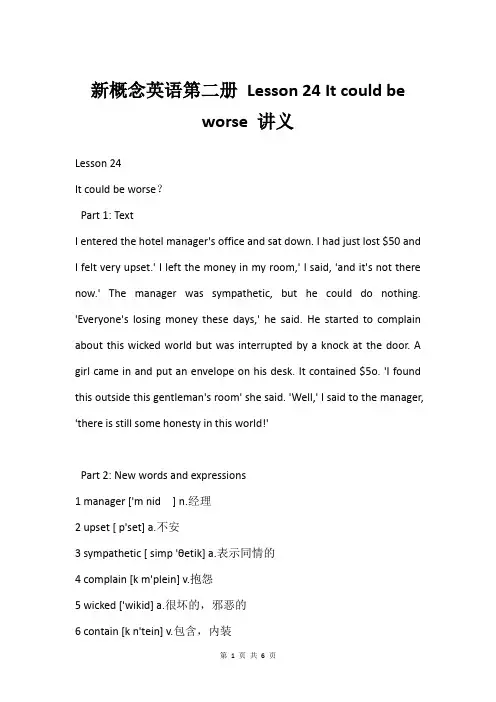
新概念英语第二册Lesson 24 It could beworse 讲义Lesson 24It could be worse?Part 1: TextI entered the hotel manager's office and sat down. I had just lost $50 and I felt very upset.' I left the money in my room,' I said, 'and it's not there now.' The manager was sympathetic, but he could do nothing. 'Everyone's losing money these days,' he said. He started to complain about this wicked world but was interrupted by a knock at the door. A girl came in and put an envelope on his desk. It contained $5o. 'I found this outside this gentleman's room' she said. 'Well,' I said to the manager, 'there is still some honesty in this world!'Part 2: New words and expressions1 manager ['m nid ] n.经理2 upset [ p'set] a.不安3 sympathetic [ simp 'θetik] a.表示同情的4 complain [k m'plein] v.抱怨5 wicked ['wikid] a.很坏的,邪恶的6 contain [k n'tein] v.包含,内装7 honesty [' nisti] n.诚实区别:boss 老板,头head 1.重要, 2. 关系亲密的人物Part 3: Notes on the text1、I entered the hotel manager's office and sat down名词修饰名词The hotel manager's office修饰名词实质名词还有: telephone number 电话号码举例: the village fair :乡村集市(the fair of the village/the fair in the village)名词修饰名词的复数表示修饰作用的名词永远是单数,但是man和woman除外Eg:5棵苹果树 5 apple trees4个书店 4 book shops3个女老师3 women teachers2个女学生2 girl students2、I had just lost $50 and I felt very upsetfeel+(adj.)upset不安(事发后);nervous:(事发前过程中)感官动词+ 形容词感官动词属于系动词感官动词: feel,look,soundtaste,smell,也叫连系动词,是非主流动词,不能单独使用做谓语,必须和表语构成系表结构。
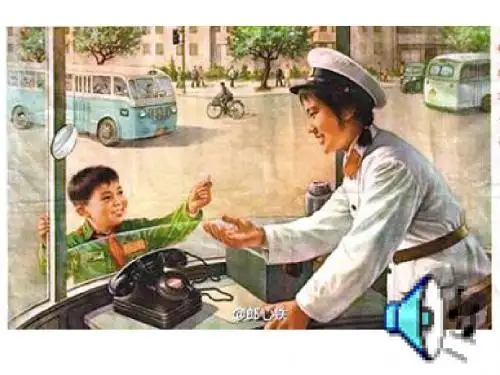




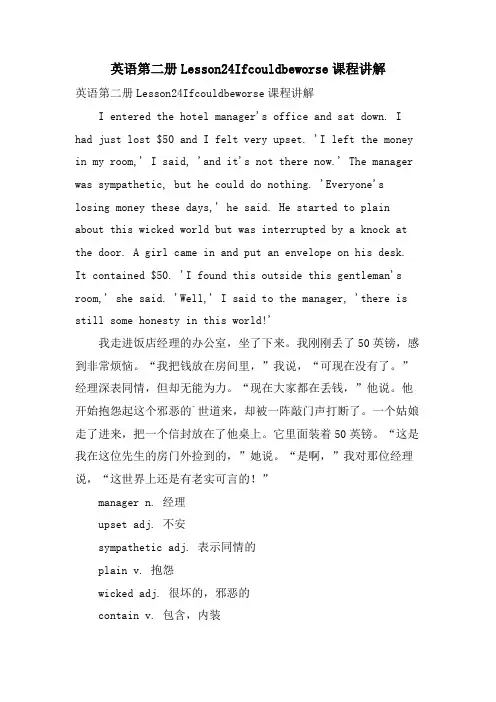
英语第二册Lesson24Ifcouldbeworse课程讲解英语第二册Lesson24Ifcouldbeworse课程讲解I entered the hotel manager's office and sat down. I had just lost $50 and I felt very upset. 'I left the money in my room,' I said, 'and it's not there now.' The manager was sympathetic, but he could do nothing. 'Everyone's losing money these days,' he said. He started to plain about this wicked world but was interrupted by a knock at the door. A girl came in and put an envelope on his desk. It contained $50. 'I found this outside this gentleman's room,' she said. 'Well,' I said to the manager, 'there is still some honesty in this world!'我走进饭店经理的办公室,坐了下来。
我刚刚丢了50英镑,感到非常烦恼。
“我把钱放在房间里,”我说,“可现在没有了。
”经理深表同情,但却无能为力。
“现在大家都在丢钱,”他说。
他开始抱怨起这个邪恶的`世道来,却被一阵敲门声打断了。
一个姑娘走了进来,把一个信封放在了他桌上。
它里面装着50英镑。
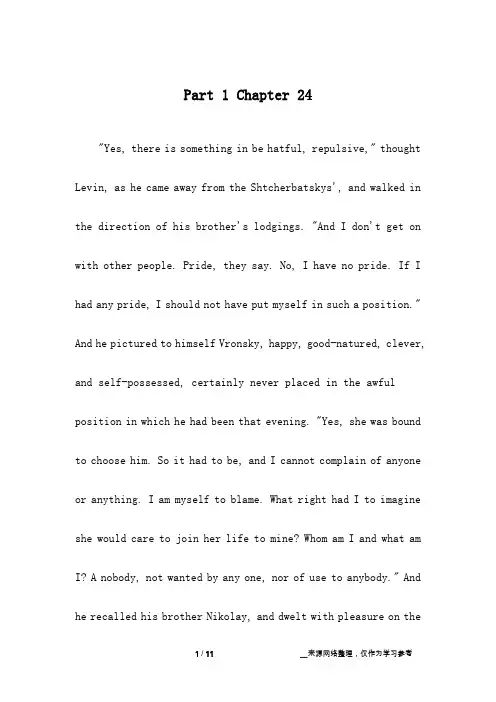
Part 1 Chapter 24"Yes, there is something in be hatful, repulsive," thought Levin, as he came away from the Shtcherbatskys', and walked in the direction of his brother's lodgings. "And I don't get on with other people. Pride, they say. No, I have no pride. If I had any pride, I should not have put myself in such a position." And he pictured to himself Vronsky, happy, good-natured, clever, and self-possessed, certainly never placed in the awful position in which he had been that evening. "Yes, she was bound to choose him. So it had to be, and I cannot complain of anyone or anything. I am myself to blame. What right had I to imagine she would care to join her life to mine? Whom am I and what am I? A nobody, not wanted by any one, nor of use to anybody." And he recalled his brother Nikolay, and dwelt with pleasure on thethought of him. "Isn't he right that everything in the world is base and loathsome? And are we fair in our judgment of brother Nikolay? Of course, from the point of view of Prokofy, seeing him in a torn cloak and tipsy, he's a despicable person. But I know him differently. I know his soul, and know that we are like him. And I, instead of going to seek him out, went out to dinner, and came here." Levin walked up to a lamppost, read his brother's address, which was in his pocketbook, and called a sledge. All the long way to his brother's, Levin vividly recalled all the facts familiar to him of his brother Nikolay's life. He remembered how his brother, while at the university, and for a year afterwards, had, in spite of the jeers of his companions, lived like a monk, strictly observing all religious rites, services, and fasts, and avoiding every sort of pleasure, especially women. And afterwards, how he had all at once brokenout: he had associated with the most horrible people, and rushed into the most senseless debauchery. He remembered later the scandal over a boy, whom he had taken from the country to bring up, and, in a fit of rage, had so violently beaten that proceedings were brought against him for unlawfully wounding. Then he recalled the scandal with a sharper, to whom he had lost money, and given a promissory note, and against whom he had himself lodged a complaint, asserting that he had cheated him. (This was the money Sergey Ivanovitch had paid.) Then he remembered how he had spent a night in the lockup for disorderly conduct in the street. He remembered the shameful proceedings he had tried to get up against his brother Sergey Ivanovitch, accusing him of not having paid him his share of his mother's fortune, and the last scandal, when he had gone to a western province in an official capacity, and there had got into troublefor assaulting a village elder.... It was all horribly disgusting, yet to Levin it appeared not at all in the same disgusting light as it inevitably would to those who did not know Nikolay, did not know all his story, did not know his heart. Levin remembered that when Nikolay had been in the devout stage, the period of fasts and monks and church services, when he was seeking in religion a support and a curb for his passionate temperament, everyone, far from encouraging him, had jeered at him, and he, too, with the others. They had teased him, called him Noah and Monk; and, when he had broken out, no one had helped him, but everyone had turned away from him with horror and disgust.Levin felt that, in spite of all the ugliness of his life, his brother Nikolay, in his soul, in the very depths of his soul, was no more in the wrong than the people who despised him. Hewas not to blame for having been born with his unbridled temperament and his somehow limited intelligence. But he had always wanted to be good. "I will tell him everything, without reserve, and I will make him speak without reserve, too, andI'll show him that I love him, and so understand him," Levin resolved to himself, as, towards eleven o'clock, he reached the hotel of which he had the address."At the top, 12 and 13," the porter answered Levin's inquiry. "At home?""Sure to be at home."The door of No. 12 was half open, and there came out into the streak of light thick fumes of cheap, poor tobacco, and the sound of a voice, unknown to Levin; but he knew at once that his brother was there; he heard his cough.As he went in the door, the unknown voice was saying:"It all depends with how much judgment and knowledge the thing's done."Konstantin Levin looked in at the door, and saw that the speaker was a young man with an immense shock of hair, wearing a Russian jerkin, and that a pockmarked woman in a woolen gown, without collar or cuffs, was sitting on the sofa. His brother was not to be seen. Konstantin felt a sharp pang at his heart at the thought of the strange company in which his brother spent his life. No one had heard him, and Konstantin, taking off his galoshes, listened to what the gentleman in the jerkin was saying. He was speaking of some enterprise."Well, the devil flay them, the privileged classes," his brother's voice responded, with a cough. "Masha! get us some supper and some wine if there's any left; or else go and get some."The woman rose, came out from behind the screen, and saw Konstantin."There's some gentleman, Nikolay Dmitrievitch," she said. "Whom do you want?" said the voice of Nikolay Levin, angrily. "It's I," answered Konstantin Levin, coming forward into the light."Who's _I_?" Nikolay's voice said again, still more angrily. He could be heard getting up hurriedly, stumbling against something, and Levin saw, facing him in the doorway, the big, scared eyes, and the huge, thin, stooping figure of his brother, so familiar, and yet astonishing in it weirdness and sickliness. He was even thinner than three years before, when Konstantin Levin had seen him last. He was wearing a short coat, and his hands and big bones seemed huger than ever. His hair had grown thinner, the same straight mustaches hid his lips,the same eyes gazed strangely and naively at his visitor. "Ah, Kostya!" he exclaimed suddenly, recognizing his brother, and his eyes lit up with joy. But the same second he looked round at the young man, and gave the nervous jerk of his head and neck that Konstantin knew so well, as if his neckband hurt him; and a quite different expression, wild, suffering, and cruel, rested on his emaciated fact."I wrote to you and Sergey Ivanovitch both that I don't know you and don't want to know you. What is it you want?"He was not at all the same as Konstantin had been fancying him. The worst and most tiresome part of his character, what made all relations with him so difficult, had been forgotten by Konstantin Levin when he thought of him, and now, when he saw his face, and especially that nervous twitching of his head, he remembered it all."I didn't want to see you for anything," he answered timidly. "I've simply come to see you."His brother's timidity obviously softened Nikolay. His lips twitched."Oh, so that's it?" he said. "Well, come in; sit down. Like some supper? Masha, bring supper for three. No, stop a minute. Do you know who this is?" he said, addressing his brother, and indicating the gentleman in the jerkin: "This is Mr. Kritsky, my friend from Kiev, a very remarkable man. He's persecuted by the police, of course, because he's not a scoundrel."And he looked round in the way he always did at everyone in the room. Seeing that the woman standing in the doorway was moving to go, he shouted to her, "Wait a minute, I said." And with the inability to express himself, the incoherence that Konstantin knew so well, he began, with another look round ateveryone, to tell his brother Kritsky's story: how he had been expelled from the university for starting a benefit society for the poor students and Sunday schools; and how he had afterwards been a teacher in a peasant school, and how he had been driven out of that too, and had afterwards been condemned for something. "You're of the Kiev university?" said Konstantin Levin to Kritsky, to break the awkward silence that followed."Yes, I was of Kiev," Kritsky replied angrily, his face darkening."And this woman," Nikolay Levin interrupted him, pointing to her, "is the partner of my life, Marya Nikolaevna. I took her out of a bad house," and he jerked his neck saying this; "but I love her and respect her, and any one who wants to know me," he added, raising his voice and knitting his brows, "I beg to love her and respect her. She's just the same as my wife,just the same. So now you know whom you've to do with. And if you think you're lowering yourself, well, here's the floor, there's the door."And again his eyes traveled inquiringly over all of them. "Why I should be lowering myself, I don't understand." "Then, Masha, tell them to bring supper; three portions, spirits and wine.... No, wait a minute.... No, it doesn't matter.... Go along."11 / 11__来源网络整理,仅作为学习参考。
Lesson 24 It would be worse单词讲解1. manager n.经理shop manager 商店经理hotel manager 酒店经理以此类推2. upset adj. 不安;焦虑be upset by sth. 某人对…感到不安He was upset by the noise. 这个噪音使他感到不安。
He was upset by the news. 这个消息使他感到不安。
be upset about…关于…使这个人感到不安Mary was upset about her mother's words. 玛丽对她母亲所说的话感到不安。
3. sympathetic adj. 表示同情的a sympathetic smile 同情的微笑I was sympathetic [to/towards] him when he was sick. 当他生病的时候,我对他表示同情。
be sympathetic [to/towards] sb. //对某人表示同情4. complain v. 抱怨(可引申为“投诉”)Jane complained to the police about the noise. 简向警方进行投诉,投诉关于噪音的问题。
complain to sb. about sth. 向某人抱怨某事He complained of the bad weather. 他抱怨这个糟糕的天气。
= He complained about the bad weather. 他抱怨这个糟糕的天气。
complain of/about 抱怨某事Tony complained that nobody had helped him. Tony 抱怨说,没有人曾经帮助过他。
complain后面接由that引导的宾语从句--------------------------------complain to sb. 向某人抱怨;;;;;;;;;;;;;;;;;;;;;;;;;;;;;;;;;;;;;;;;;;;;;;;;;;;;;;;;;;;;;;5. wicked adj. 很坏的,邪恶的(比bad表达的“坏”更进一步,达到一种狠的程度,而且是一种邪恶式的坏)a wicked look 邪恶的神情(不怀好意的神情)It's wicked of sb. 某人非常的坏/邪恶It's wicked of sb. to do sth. 某人非常坏/邪恶的去做某事It's wicked of him to say such things. 他非常邪恶的说了这些话。
Douglas: May our partnership deepen and prosper.道格拉斯:预祝我们的伙伴关系不断加深和发展。
Douglas: Now let’s raise our glasses: to Silver Heaven Tea!道格拉斯:现在让我们为“银⾊天堂”公司⼲杯。
Caroline: To Silver Heaven!卡罗琳:为银⾊天堂公司⼲杯。
Harvey: Cheers!哈维:⼲杯!Victoria: Silver Heaven!维多利亚:⼲杯!Lian: Cheers!丽安:⼲杯!Lok: Cheers!洛克:⼲杯!Lian: Thank you.丽安:谢谢!Lok: Thank you. The feeling is mutual.洛克:谢谢各位,我也以同样的祝辞回敬各位。
⽆论是商务宴会或者亲朋好友的聚会,祝酒是⼀种⾮常通⾏的做法。
在致祝酒辞之前,主⼈可以⾸先请客⼈们将酒杯满上,在英语⾥我们说:“ charge their glasses” ,如果是⾮常正式的祝酒场合,则主⼈可以要求全体宾客起⽴,也就是“ be upstanding “,但是请注意,在西⽅的习惯中,如果是为某⼈祝酒,则此⼈在其它宾客站⽴起来时他本⼈不必起⽴。
在我们的课⽂⾥,由于这⼀商务聚餐不是那么正式,所以洛克夫妇在主⼈致过祝酒辞之后就随着主⼈⼀⽅⼀起说了cheers.好,现在让我们跟着⽼师⼀起练习有关的句型。
I’d like to propose a toast.Please be upstanding.Could everyone please charge their glasses.Let’s raise our glasses.To our new partner!Cheers!各位听众朋友,您现在收听的是澳⼤利亚澳洲⼴播电台为您编播制作的《商业英语教程》节⽬。
我们现⾏进⾏的是第⼆⼗四课,商务聚餐第⼆⼗四课: 商务聚餐Lesson 24: Celebrating现在让我们继续学习新的对话内容。
PROBLEMS 24-1 Maxwell’s Equations1. Gauss ’ laws for electric fields and for magnetic fields differ due to the lack of magnetic charges. Assume that magnetic monopoles (magnetic charges) exist; denote them by the symbol M . Rewrite Gauss ’ law for magnetic fields, and give the SI units for M .2. Equations 24-1 through 24-4 apply in a vacuum. Write Maxwell ’s equations for matter instead by using the dielectric constant εr and the relative permeability μr .24-3 Properties of Electromagnetic Waves3. A plane electromagnetic wave has a maximum electric field of 3.20⨯10-4 V/m. Find the maximum magnetic field.4. If the electric field for a plane electromagnetic wave is given by E x = 0, E y = E 0 cos (kz +ωt ), and E z = 0, what are B and the direction of propagation of the wave?5. The electric field of a certain plane electromagnetic wave is given by E x = 0, E y = 0, and .cos[()],15z E 2010t-x/c π= with c = 3.0⨯108 m/s and all quantities in SI units. Write expressions for the components of the magnetic field of the wave.6. A plane electromagnetic wave of wavelength 1.2 m propagates in the z -direction. The electric field points in the y -direction and has amplitude of 3.0 V/m. Write an expression for the magnetic field, including its amplitude in SI units. Assume that the electric field is at its maximum at z = 0, t = 0.24-4 Energy Transport and the Poynting V ector7. A radio station emits a signal with a power of 50 kW. What are the amplitudes of the electric field and magnetic field at distances of 10 km and 1000 km? Assume that the signal far from the antenna is transmitted with equal intensity in all directions. (Real radio stations cannot afford to transmit their energy in this way, and their antennas distribute energy with a high degree of directionality.)8. The electric field for a given electromagnetic wave has a peak value 50 mV/m. What is the intensity of the wave?9. Assume that a 100 W light bulb emits light equally in all directions. What are the peak values of the electric and magnetic fields at a distance of 1 m?10. A laser delivers 103 J of energy in a pulse that lasts 10-9 s. What are the peak electric and magnetic fields for a laser beam of diameter 10-3 m?11. What is the intensity of a plane traveling electromagnetic wave if B m is 1.0⨯10-4 T?12. The maximum electric field at a distance of 10 m from an isotropic point light source is 2.0 V/m. What are (a) the maximum value of the magnetic field and (b) the average intensity of the light there? (c) What is the power of the source?13. An airplane flying at a distance of 10 km from a radio transmitter receives a signal of intensity 10 μW/m 2. Calculate (a) the amplitude of the electric field at the airplane due to this signal, (b) the amplitude of the magnetic field at the airplane, and (c) the total power of the transmitter, assuming the transmitter to radiate uniformly in all directions.24-5 Radiation Pressure14. A plane electromagnetic wave of wavelength 12 μm and an electric field amplitude of 10 V/m impinges on a totally reflecting surface of area 10 cm 2. What is the radiation pressureexerted by the wave?15. High-power lasers are used to compress a plasma (a gas of charged particles) by radiation pressure. A laser generating pulses of radiation of peak power 1.5⨯103 MW is focused onto 1.0 mm 2 of high-electron-density plasma. Find the pressure exerted on the plasma if the plasma reflects all light beams directly back along their path.16. What is the radiation pressure 1.5 m away from a 500 W light bulb? Assume that the surface on which the pressure is exerted faces the bulb and is perfectly absorbing and that the bulb radiates uniformly in all directions.17. Prove, for a plane electromagnetic wave that is normally incident on a plane surface, that radiation pressure on the surface is equal to the energy density in the incident beam. (This relation between pressure and energy density holds no matter what fraction of the incident energy is reflected.)18. A particle in the solar system is under the combined influence of the Sun ’s gravitational attraction and the radiation force due to the Sun ’s rays. Assume that the particle is a sphere of density 1.0⨯103 kg/m 3 and that all incident light is absorbed. (a) Show that, if its radius is less than some critical radius R , the particle will be blown out of the solar system. (b) Calculate the critical radius.Problems1. 0enc B dA M μ⋅=⎰ , A ⋅m.2. enc r 0q E dA εε=⎰ , 0r1B dA μ⋅=⎰ , 00r 0enc r 1d B ds E dA i dt μεεμμ⋅=⋅+⎰⎰ ,r r d 1E ds B dA dt εμ⋅=-⋅⎰⎰ .3. 1.07⨯10-12 T.4. cos(),m x E B kz t cω=+in the - z direction.5.B x = 0, B z = 0,.cos[(/)].95y B 671010t x c π-=-⨯- 6. 88510sin(510).3z B z t ππ-=--⨯ 7. E m = 1.7⨯10-1 V/m, B m = 5.8⨯10-10 T at 10 km;E m = 1.7⨯10-3 V/m, B m = 5.8⨯10-12 T at 1000 km.8. 3.3⨯10-6 W/m 2.9.E m = 77.5 V/m, B m = 2.58⨯10-7 T.10. 3.1⨯1010 V/m, 1.0⨯102T.11. 1.2⨯106 W/m2.12. (a) 6.7 nT; (b) 5.3 mW/m2; (c) 6.7 W.13. (a) 87 mV/m; (b) 0.30 nT; (c) 13 kW.14. 8.8⨯10-8 Pa.15. 1.0⨯107 Pa.16. 5.9⨯10-8 Pa.17. proof problem.18. (b) 508 nm.。